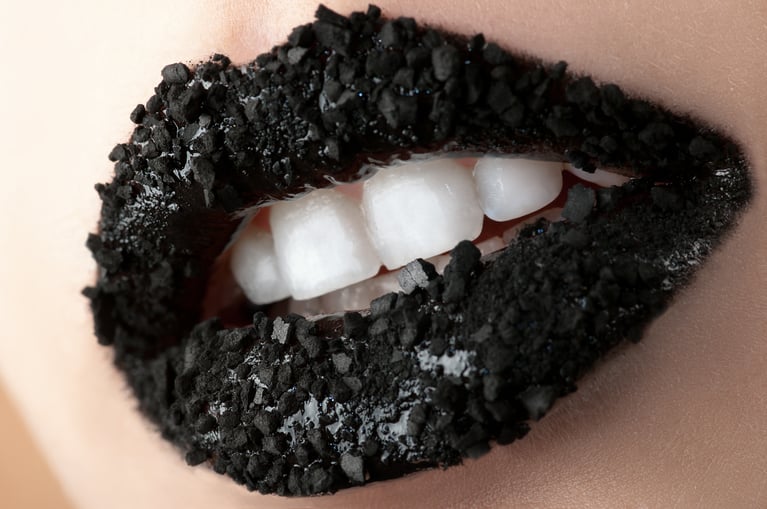
Using a black substance to whiten your teeth might seem counterintuitive, but fans of activated charcoal say it’s the best option for transforming your chompers from yellow and dingy to white and sparkly — as long as you can deal with the mess.
But, is this DIY approach really the best way to whiten your teeth?
How Activated Charcoal Works to Whiten Teeth
Activated charcoal is approved by the U.S. Food and Drug Administration as a “safe and effective” treatment for acute poisoning, thanks to its ability to sop up certain chemicals and toxins in your stomach like a sponge, reducing the amount absorbed by up to 47 percent, according to one study. The poisons are then released through your bowel movements.
Charcoal has a long history dating back to Ancient Egypt, but it wasn’t used as a medical treatment until the 1700s. So, how did activated charcoal get its reputation as a teeth whitening treatment? Through social media and well-known bloggers like Wellness Mama who claims it’s able to “pull toxins” from the teeth, leaving it shades lighter. “After a few uses, my teeth were noticeably whiter,” she wrote on her blog.
While there are toothpastes with activated charcoal in them, it typically comes in capsule form — you simply break open the capsule, mix it with water and use a toothbrush to spread it over your teeth before rinsing three to five minutes later.
The results, according to fans, are noticeable almost immediately.
“My teeth were noticeably whiter at the end of this two-week experiment than they were at the beginning,” another blogger wrote.
Why You Shouldn’t Whiten Your Teeth With Activated Charcoal
It seems like activated charcoal is the best (and most inexpensive) way to whiten teeth. Using it may very well give you a temporarily whiter look, but so can simply brushing your teeth after eating foods that can stain your teeth, like blueberries and coffee.
Plus, we simply don’t know the long-term effects of regularly using charcoal to whiten your chompers. The trend is still relatively new and, though many people are doing it, there are no long-term studies on how it can affect your teeth over time — especially if you use it several times a week for an extended period. The reason: activated charcoal is abrasive on teeth and could possibly lead to enamel erosion over time.
Many toothpaste manufacturers put crystals or other abrasives in their toothpastes and advertise them as “more whitening” and “better at cleaning” than other toothpastes, thank to their ability to slough off the bacteria, food and plaque that covers our teeth. Our tooth enamel is the hardest tissue in the human body, but it’s not made of living cells, meaning it’s not invincible — and once it goes away (through things like erosion or chips and cracks) it’s gone for good. We know that improper brushing and neglect can cause erosion, but brushing with abrasive toothpastes can cause it, too.
The American Dental Association ranks toothpastes according to how abrasive they are on enamel on a scale from 0 to 250. The scale — known as the Relative Dentin Abrasivity (RDA) scale — ranks any toothpaste from 0 to 80 is low abrasive up to anything from 150 to 250 is considered highly abrasive and damaging to teeth.
We don’t know how abrasive activated charcoal is on our teeth because it hasn’t been studied, but many people who use it report a gritty texture that could have an effect on tooth enamel if used regularly. Also, activated charcoal is known to cause constipation when ingested, meaning that swallowing even a little bit on a regular basis could cause bathroom problems in some people.
The Best Way to Whiten Your Teeth
Anecdotes from bloggers and social media shows that using activated charcoal can certainly whiten your teeth at least temporarily, but we simply do not know enough about the long-term effects. That’s why it’s important to stick with other tried-and-true methods to whiten teeth.
Whitening toothpastes can help clear some surface stains on the teeth — and a recent study shows that not all of these toothpastes are abrasive. Store-bought whitening strips can also help, but your best option is to go for professional treatments that are given in a dentist’s office. In-office teeth whitening might be more expensive than store-bought toothpastes, but they are done under the care of your dentist, meaning it’s safer and you’ll get better (and often permanent) results if you follow post-treatment instructions.
Ready to get a whiter smile? Make an appointment for a consultation — and let others deal with all the mess that comes with using activated charcoal for whiter teeth.



